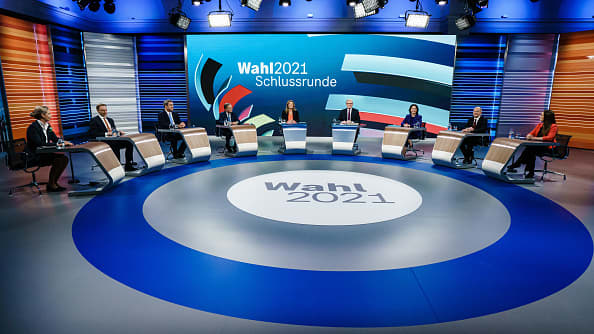
Candidates to the German 2021 election.
Pool | Getty Images News | Getty Images
Germany’s federal elections on Sunday will usher in a new political era for both the country and the wider European Union.
Angela Merkel, the bloc’s longest serving leader, is leaving the German chancellery after 16 years in power. Voter polls suggest that the election outcome is highly uncertain, with several coalition configurations possible.
CNBC takes a look at the main political figures that could shape the future of Europe’s largest economy.
Armin Laschet
Candidate for the chairmanship of Germany’s Christian Democratic Union party, Armin Laschet, gestures as he takes part in a discussion at the party’s headquarters in Berlin on Jan. 8, 2021.
CHRISTIAN MANG / POOL / AFP) (Photo by CHRISTIAN MANG/POOL/AFP via Getty Images
However, Laschet’s popularity has fallen over the past month and that has pushed the CDU down in the opinion polls. Earlier this year he was caught laughing in the background when Germany’s President Frank-Walter Steinmeier gave a speech addressing the victims of flooding in western parts of the country.
There are open questions about the future role of the CDU — the party from which Germany’s three longest-serving post-war chancellors have come from — if Laschet loses the election.
“CDU/CSU traditionally consider themselves as Germany’s natural governing force; infighting and a sense of anger after a painful defeat could create risks for whoever leads the next government, potentially far beyond election night,” Carsten Nickel, deputy director of research at consultancy firm Teneo, said in a note.
Annalena Baerbock
The Green party leader was, at one point, the candidate to watch in this federal election, seen as the main challenger to Laschet.
She represented a new and younger voice in German politics and contributed to a new approach from the Green Party —seemingly more aware that it needs to coordinate with business leaders on how to transition to a carbon-neutral economy.
BERLIN, GERMANY – MARCH 15: Annalena Baerbock, co-leader of the German Greens party.
Sean Gallup | Getty Images News | Getty Images
However, her popularity took a hit when accusations of plagiarism emerged. Baerbock has denied any wrongdoing.
Her party is currently placing third in opinion polls, suggesting she could have a key role in coalition talks.
Olaf Scholz
Germany’s current finance minister has perhaps been the biggest surprise in the campaign.
The candidate for Germany’s socialist party, the SPD, has seen his popularity rise after the devastating floods in parts of the country earlier this summer, to a large extent because of the campaign slip-ups on the conservative side. As such, the SPD is narrowly leading opinion polls.
Olaf Scholz, chancellor candidate of the German Social Democrats (SPD), speaks at an election campaign rally on September 05, 2021 in Leipzig, Germany. Scholz currently has an ample lead over his main rival, Armin Laschet of the Christian Democrats (CDU/CSU), ahead of federal parliamentary elections scheduled for September 26.
Sean Gallup | Getty Images News | Getty Images
Opposition lawmakers in Germany argue that a socialist chancellor would not be good for the country’s finances. In addition, scandals involving the finance ministry during his leadership have also emerged.
However, none of these elements seem to be having an impact on voters’ opinion of Scholz, who has described himself as the most experienced candidate — having not only been finance minister, but also vice chancellor in the current coalition.
Christian Lindner
Lindner is the leader of the liberal Free Democratic Party, which has played a key role in creating coalition governments in the past.
With opinion polls projecting that at least three parties will be needed to get a majority at the German parliament, Lindner is expecting to get some fresh political momentum at this vote.
Christian Lindner, head of the German Free Democratic Party (Freie Demokratische Partei, or FDP)
Thomas Niedermueller | Getty Images
The party is polling fourth in some projections, neck-a-neck with the right-wing AfD party. Lindner has said he is ready to join forces with the CDU or SPD, or even the Greens.
Alice Weidel
She is the co-leader of the anti-immigration party, the Alternative for Germany.
Although the party has no chance of winning the majority of seats in parliament, experts will be monitoring how well the party does in this election.
The AfD entered the German parliament for the first time in the last election in 2017.
Alice Weidel, AfD candidate for the 2021 federal election.
picture alliance | picture alliance | Getty Images




